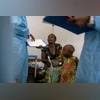)
Still, African nations failed to build up stockpiles of shots even after they agreed to a plan to improve the continent’s emergency response capabilities | Photo: Bloomberg
By Janice Kew and Antony Sguazzin
Public health officials fighting a lethal outbreak of mpox in Africa are struggling to avoid mistakes that cost lives during the Covid-19 pandemic, starting with the slow acquisition of vaccines.
In the week since the World Health Organization called the spread of the potentially deadly disease a public-health emergency of international concern, there has been constant talk around getting the inoculations onto African soil. These are now expected to arrive next week.
Crucially, plans to ensure shots get into arms are also underway.
“It’s about putting in place strong supply chain management that can accommodate the vaccine that we are bringing in the next few days,” Africa Centres for Disease Control and Prevention Director General Jean Kaseya said on Tuesday.
Mpox has been present on the continent since the 1970s, with little international attention. But even though it is the only region where the disease is endemic, it didn’t receive vaccines for the virus in 2022 as the infectious illness spread around the world.
It was a similar story during the Covid-19 pandemic. When those shots first became available, Africa found itself at the back of the queue.
Still, African nations failed to build up stockpiles of shots even after they agreed to a plan to improve the continent’s emergency response capabilities.
Part of that failure is linked to a lack of local vaccine production. The region imports almost all of its shots and a drive to set up a vaccine industry has stumbled. Kaseya is adamant this time will be different.
“Without local manufacturing in Africa, we are exposed,” he said.
The Biovac Institute, a South African vaccine maker, will discuss with the Africa CDC how to transfer technology so that the company can make mpox vaccines, said Chief Executive Officer Morena Makhoana.
Africa CDC is in talks with Bavarian Nordic A/S, one of a few companies with an approved mpox vaccine, about getting shots quickly while ensuring that the continent’s manufacturers also get the ability to fill vials with the vaccine made by the Danish company.
This would allow them to produce locally, lowering the price without compromising on quality, Kaseya told an online press briefing.
The continent needs 10 million doses, but the shots are very expensive. At about $100 a dose, “many countries can’t afford to buy them at that price,” said Helen Rees, founder of the Reproductive Health and HIV Institute in Johannesburg.
Bavarian Nordic has said it will be able to meet the immunization needs of African nations. The problem has been a lack of orders: Manufacturers won’t make large quantities of vaccine unless they have some sort of guaranteed market.
“Because this is a global health threat, we do need to look at funding to subsidize vaccines for low and middle-income countries where cases are being seen,” said Rees, who also chairs the WHO’s African Regional Technical Advisory Group on Immunization. African nations need to get their supplies now, before the threat spreads, she said.
“Unless the African region has access to all of these products that are required to respond to an emergency, we are going to forever be waiting in line,” said Rees.
Even as shots arrive, there won’t be enough to vaccinate widely. Africa CDC plans to prioritize populations at high risk and people who may come into contact with the disease through household or sexual networks.
While the bulk of the spread on the eastern flank of the Democratic Republic of the Congo is in children, according to some research, there’s almost an entirely separate outbreak among adults, many of them women identifying as sex workers.
“We need people to accept the vaccine,” Kaseya said. “If today we stop this outbreak in Africa we are also saving lives” elsewhere in the world.
First Published: Aug 21 2024 | 8:14 AM IST


































